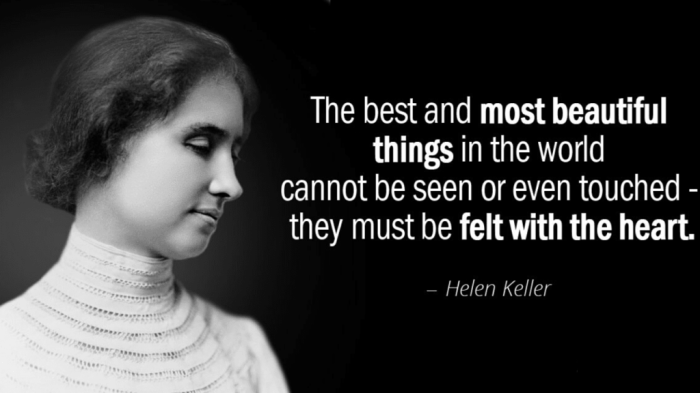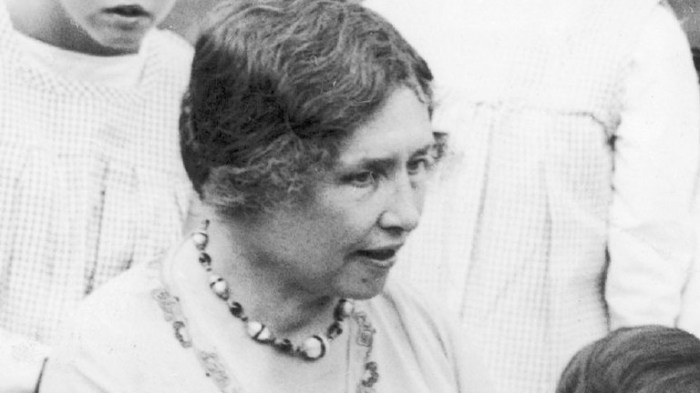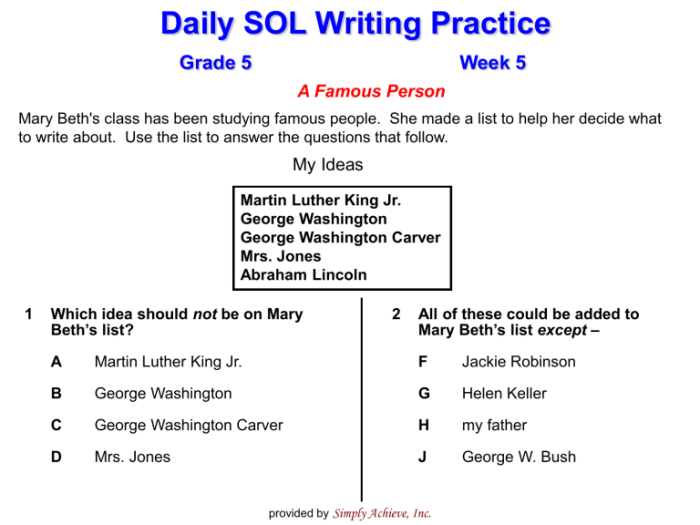The Great Minds Helen Keller Answer Key unveils the remarkable life and profound impact of Helen Keller, a deafblind woman who shattered societal barriers and became an enduring symbol of human resilience and advocacy. This comprehensive guide delves into her journey, contributions, and lasting legacy, offering insights into her unwavering determination, transformative methods, and enduring influence on education, social justice, and popular culture.
Helen Keller’s Life and Accomplishments
Helen Keller, born in 1880, was an extraordinary individual who overcame the challenges of being deaf and blind to become an accomplished author, lecturer, and advocate for social justice. Despite losing her sight and hearing at the age of 19 months, Keller’s unwavering determination and the support of her dedicated teacher, Anne Sullivan, enabled her to achieve remarkable feats.
Keller’s education was a groundbreaking journey. Sullivan taught her to communicate using sign language and braille, unlocking the world of language and knowledge for Keller. Keller’s thirst for learning extended beyond traditional subjects; she pursued higher education at Radcliffe College, graduating cum laude in 1904.
Keller’s literary works, including her autobiography “The Story of My Life,” captivated audiences with their insights into the human experience and the power of perseverance. Her writings eloquently conveyed her experiences as a deafblind individual and her unwavering belief in the potential of all people.
Beyond her literary achievements, Keller was a tireless advocate for social justice. She worked closely with organizations such as the American Foundation for the Blind and the American Civil Liberties Union, fighting for the rights of people with disabilities, women, and marginalized communities.
Keller’s unwavering spirit and remarkable accomplishments have left an enduring legacy. She remains an inspiration to individuals worldwide, demonstrating that disability does not define one’s potential but rather provides an opportunity for extraordinary achievements.
Helen Keller’s Contributions to Education

Helen Keller’s pioneering work in education revolutionized the way deafblind individuals were taught and perceived. Her methods, developed in collaboration with Anne Sullivan, emphasized the importance of tactile communication and sensory stimulation.
Keller’s approach involved using sign language, braille, and other tactile techniques to convey information and foster language development. She believed that deafblind individuals were capable of learning and achieving just like their sighted and hearing peers.
Keller’s educational methods were widely adopted and continue to influence the field of deafblind education today. Her legacy as an educator lies in her unwavering belief in the potential of all students, regardless of their disabilities.
Helen Keller’s Advocacy for Social Justice

Helen Keller’s advocacy for social justice extended beyond the rights of people with disabilities. She was a vocal supporter of women’s suffrage, workers’ rights, and civil rights for all. Keller believed that everyone deserved equal opportunities and a fair chance to succeed.
Keller’s activism included speaking out against discrimination and injustice. She worked closely with organizations such as the NAACP and the American Civil Liberties Union, lending her voice to the fight for equality.
Keller’s unwavering advocacy for social justice left a profound impact on American society. Her legacy continues to inspire activists and advocates worldwide to fight for the rights of all marginalized communities.
Helen Keller’s Literary Works
Helen Keller’s literary works, including her autobiography “The Story of My Life,” provided a unique perspective on the human experience. Her writings explored themes of disability, perseverance, and the power of language.
Keller’s autobiography, published in 1903, recounted her journey from a young child who had lost her sight and hearing to a highly accomplished woman. The book became an instant bestseller and has since been translated into over 50 languages.
In addition to her autobiography, Keller wrote essays, articles, and speeches that addressed social issues, education, and disability rights. Her literary works continue to be studied and admired for their insights and eloquence.
Helen Keller’s Impact on Popular Culture: Great Minds Helen Keller Answer Key
Helen Keller’s remarkable life and accomplishments have been widely depicted in popular culture. Her story has been adapted into films, television shows, and literary works, reaching a vast audience.
One of the most famous portrayals of Keller is the 1962 film “The Miracle Worker,” which chronicled her early life and relationship with Anne Sullivan. The film won two Academy Awards and introduced Keller’s story to a new generation.
Keller’s image and story have also been used in literature, music, and art. Her legacy continues to inspire creators and audiences worldwide.
Helen Keller’s Influence on Modern Thought

Helen Keller’s ideas and perspectives continue to resonate in contemporary society. Her belief in the potential of all individuals, regardless of their disabilities, has inspired countless people to overcome challenges and pursue their dreams.
Keller’s legacy extends beyond disability rights. Her advocacy for social justice and equality has influenced modern thought on issues such as education, human rights, and the rights of marginalized communities.
In the 21st century, Helen Keller’s message remains as relevant as ever. Her life and work serve as a reminder that disability does not define one’s potential and that everyone deserves equal opportunities and a chance to succeed.
User Queries
What was Helen Keller’s most significant contribution to education?
Helen Keller’s most significant contribution to education was her role in revolutionizing the education of deafblind individuals. She developed a unique system of communication and learning that allowed deafblind people to access education and achieve their full potential.
How did Helen Keller advocate for social justice?
Helen Keller was a tireless advocate for social justice, particularly for the rights of people with disabilities. She worked to raise awareness about the challenges faced by people with disabilities and fought for their equal rights and opportunities.
What are the key themes of Helen Keller’s literary works?
The key themes of Helen Keller’s literary works include the power of education, the importance of social justice, and the indomitable human spirit. Her writings explore the challenges and triumphs of living with disabilities, the need for empathy and understanding, and the transformative power of hope.

